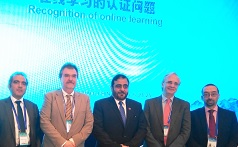UNIR supports the Qingdao Declaration for the use of TICS towards a more inclusive educational system
UNIR (Universidad Internacional de La Rioja, http://www.unir.net), through UNIR Research (http://research.unir.net) participated in the International Conference on ICT and Post-2015 Education organized by UNESCO and the Ministry of Education of the People´s Republic of China and the Chinese National Commission for UNESCO. UNIR, has been invited thanks to the UNESCO Chair on eLearning (http://unesco-elearning.unir.net) and the ICDE Chair on Open Educational Resources.

The UNIR accumulated experience on the implementation of ICT for learning is one of the key contributions of its team to this conference. UNIR Research is working on several research projects focus on the personalization of learning pathways, the integration of formal and non-formal settings, and the development of supporting systems for teachers and learners through the academic programs.
According to Dr. Daniel Burgos, Vice-chancellor for Research and Technology (UNIR Research, http://research.unir.net) and UNESCO Chair on eLearning, this projects are lead “to ensure a productive and useful dialogue between the ICT for education and its practical application to support a better quality on education”.
Qingdao Declaration
Precisely, the Qingdao declaration states that “the remarkable advances in Information and Communication Technologies (ICT) and the rapid expansion of internet connectivity have made today’s world increasingly interconnected and made the knowledge more accessible for every girl and boy, woman and man. To achieve the goal of Inclusive and Equitable Quality Education and Lifelong Learning by 2030, ICT must be harnessed to strengthen education systems, knowledge dissemination, information access, quality and effective learning, and more efficient service provision”.
Dr. Burgos defended on the Conference that “the technology for itself, is only a tool, but well integrated in the educational methodology, it can enhances, magnifies and ease its impact and scope”, in order to make possible one of the key goals of the Qingdao Declaration “to join forces and share resources to create equitable, dynamic, accountable, and sustainable learner-centered digital learning ecosystems”.
In addition, the global leaders on education stressed in the declaration that “we are convinced that equitable and inclusive access to quality education for all across life is an imperative for building sustainable and inclusive knowledge societies”.
